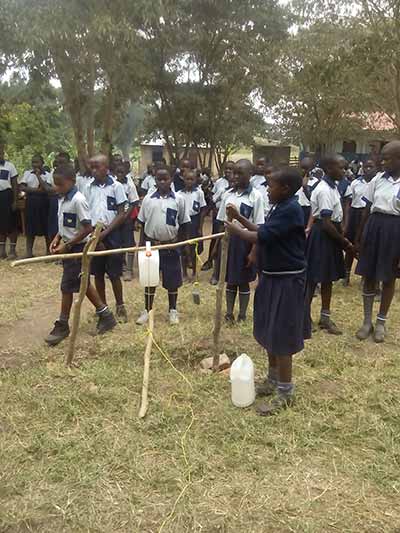
project report
"Wash A Million Hands!" project which started in 2010, has been lasting for 7 years. Here we report the results of the project as of December 2016.
Millennium Development Goals (MDGs) had a goal to decrease the infant mortality rate which is now taken over to Sustainable Development Goals (SDGs) by 2030. Since 2016, we started promoting the activity to spread correct handwashing using soap to achieve the goals of "3. Good Health and Well-being", "6. Clean Water and Sanitation" and "8. Decent Work and Economic Growth" which consist the 17 articles of SDGs.
Education for 1.2 million mothers
We continuously educate handwashing to the village people. The handwashing ambassadors expand the home handwashing equipment "Tippy Tap" and inform the importance of handwashing to 1.2 million mothers annually.
The handwashing rate has increased to 36%.
The rate of people who wash their hands with soap after toilet was 14% in 2007, but has increased to 33.2% in 2015 and 36% in 2016. At the same time, under 5-years old children have become less and less suffered from diarrhea.
Some educational materials in multiple languages are made and distributed to promote handwashing using soap. We are aiming to distribute these original materials to refugees in the Northern Nile and Karamoja District.
Celebrate the "World's Handwashing Day" with the President
As a cooperation of the administrative office with the water and hygiene section of the Government, a ceremony was held in Kamuli District on October 14, 2016. With inviting Yoweri Museveni, the President of Uganda as the main guest, the chairman of the Parliament, ministers and Diet members attended the event as well as general citizens. The event provided a good opportunity to promote handwashing nationally.
Muleete Village became a role model of handwashing practice

In Muleete Village located in southwestern Uganda, a number of people used to be suffered from diseases because of the unhygienic environment. But the activities of school children made the village a role model of handwashing practice.
The school children who learned about the relationship between hygiene and diseases, tell their parents and friends the knowledge and spread handwashing throughout the village. Telling the children in a school turned out to be more effective than convincing the parents by visiting their home. As a result of the activity, the number of patients has decreased remarkably in the Muleete Village. More than half of the village people were suffered from diseases such as diarrhea or dysentery caused by unhygienic water condition before, but the simple custom of handwashing using soap enabled to prevent them.
